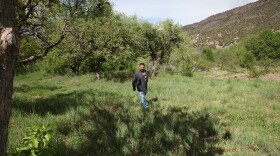Congress has yet to establish a new Farm Bill after the last one expired in September after five years.
The Farm Bill contains clauses known as the nutrition title, the disaster title, the conservation title, that are vital in terms of providing services like food stamps or drought assistance.
The continued delay has left many wondering what the implications might be. Director and Secretary of New Mexico's Department of Agriculture Jeff Witte discussed the impacts New Mexico could face if the Farm Bill doesn’t get signed soon.
JEFF WITTE: So the Farm Bill is a federal legislation that really provides a lot of policy and guidance in programs related to agriculture and food. Many of the products that are grown in New Mexico are now covered by the Farm Bill, you've got things like chile, pecans, and specialty crops.
It also includes, in today's world, the disaster programs that we've had to use in this state due to the wildfires, due to drought, things like that.
And then when you kick over to the food side of it, the biggest part about 85% of the Farm Bill these days is around nutrition title . So things like SNAP, the Supplemental Nutrition programs, they also come through the Farm Bill. So it's a pretty important piece of legislation not only for New Mexico, but for the US.
KUNM: So if the Farm Bill continues to be delayed, how will that impact the state?
WITTE: A lot of the programs, because of the continuing resolution that was just passed, are still funded. So technically, those programs are still in place. So really the bigger deadline is going to be December 31st.
After December 31st, a lot of the programs revert back to what we call permanent Farm Bill. That's when it gets a little more challenging, not only for New Mexico, but for the rest of the US. So as an example, some of the people estimate that while dairy producers in New Mexico today are getting $15 to $16 a hundredweight for their milk, if we revert back to a permanent Farm Bill after January 1st, the parity value of milk could be over $50 a hundredweight. If you calculate that out, that would raise the price of milk substantially in the grocery store.
So a lot of people will ask me if I think we're going to get a Farm Bill or an extension. I have no doubt that we will get either an extension of the Farm Bill or a new Farm Bill passed by December 31st. Because no one wants to go back to the permanent titles and go back to parity and increase the price of commodities to that level.
KUNM: What are you hearing from farmers and ranchers and others in the agriculture community right now in terms of challenges they’re facing?
WITTE: Well, not related to the Farm Bill, but there's certainly challenges out there. We're dealing with disaster assistance programs in New Mexico, because of the wildfires, because of drought. That's the number one concern is the time is ticking to address the disaster situations and get the producers the coverage that they need so that they can stay in business or or replace lost fences, lost livestock and lost feed.
So you've got to have a continuing resolution, you got to have a federal budget. There will always be pressure on Congress to address those issues in a timely fashion. They may wait till the last second, but they will get it done. It's the uncertainty that's the most unnerving for all producers, and in many cases, even though the consumers that are out there are dependent on those programs.
KUNM: What should New Mexicans be aware of if Congress doesn’t pass a Farm Bill soon?
WITTE: Well, I think the number one thing is you've got people who are dependent on some of the nutrition title, the SNAP program and things like that. So folks in general need to communicate with their Congress folks and members of the US Senate how important those programs are, producers the same way. It's these disaster titles that are now part of the Farm Bill that have been really most important. The conservation title has also been a really beneficial thing for New Mexico producers.
So I think people just need to keep an eye on things and just understand that there's a lot of forces at play in a thing like the Farm Bill. And it's an important piece of legislation that will have to be passed at some point in time to ensure that we've got a good stable agricultural and food system in the US.
KUNM: Thank you Secretary Witte.
WITTE: You bet.
Support for this coverage comes from the Thornburg Foundation.






